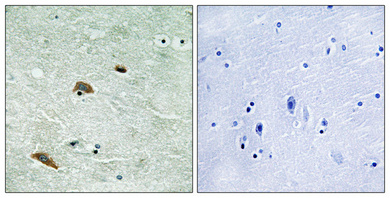TTK (phospho Thr676) Polyclonal Antibody
- SPECIFICATION
- CITATIONS
- PROTOCOLS
- BACKGROUND

Application
| IHC-P |
|---|---|
| Primary Accession | P33981 |
| Reactivity | Human, Mouse |
| Host | Rabbit |
| Clonality | Polyclonal |
| Calculated MW | 97072 Da |
| Gene ID | 7272 |
|---|---|
| Other Names | TTK; MPS1; MPS1L1; Dual specificity protein kinase TTK; Phosphotyrosine picked threonine-protein kinase; PYT |
| Dilution | IHC-P~~N/A |
| Format | Liquid in PBS containing 50% glycerol, 0.5% BSA and 0.09% (W/V) sodium azide. |
| Storage Conditions | -20℃ |
| Name | TTK |
|---|---|
| Synonyms | MPS1, MPS1L1 |
| Function | Involved in mitotic spindle assembly checkpoint signaling, a process that delays anaphase until chromosomes are bioriented on the spindle, and in the repair of incorrect mitotic kinetochore-spindle microtubule attachments (PubMed:18243099, PubMed:28441529, PubMed:29162720). Phosphorylates MAD1L1 to promote the mitotic spindle assembly checkpoint (PubMed:18243099, PubMed:29162720). Phosphorylates CDCA8/Borealin leading to enhanced AURKB activity at the kinetochore (PubMed:18243099). Phosphorylates SKA3 at 'Ser-34' leading to dissociation of the SKA complex from microtubules and destabilization of microtubule-kinetochore attachments (PubMed:28441529). Phosphorylates KNL1, KNTC1 and autophosphorylates (PubMed:28441529). Phosphorylates MCRS1 which enhances recruitment of KIF2A to the minus end of spindle microtubules and promotes chromosome alignment (PubMed:30785839). |
| Tissue Location | Present in rapidly proliferating cell lines. |

Thousands of laboratories across the world have published research that depended on the performance of antibodies from Abcepta to advance their research. Check out links to articles that cite our products in major peer-reviewed journals, organized by research category.
info@abcepta.com, and receive a free "I Love Antibodies" mug.
Provided below are standard protocols that you may find useful for product applications.
Background
Phosphorylates proteins on serine, threonine, and tyrosine. Probably associated with cell proliferation. Essential for chromosome alignment by enhancing AURKB activity (via direct CDCA8 phosphorylation) at the centromere, and for the mitotic checkpoint.
If you have used an Abcepta product and would like to share how it has performed, please click on the "Submit Review" button and provide the requested information. Our staff will examine and post your review and contact you if needed.
If you have any additional inquiries please email technical services at tech@abcepta.com.













 Foundational characteristics of cancer include proliferation, angiogenesis, migration, evasion of apoptosis, and cellular immortality. Find key markers for these cellular processes and antibodies to detect them.
Foundational characteristics of cancer include proliferation, angiogenesis, migration, evasion of apoptosis, and cellular immortality. Find key markers for these cellular processes and antibodies to detect them. The SUMOplot™ Analysis Program predicts and scores sumoylation sites in your protein. SUMOylation is a post-translational modification involved in various cellular processes, such as nuclear-cytosolic transport, transcriptional regulation, apoptosis, protein stability, response to stress, and progression through the cell cycle.
The SUMOplot™ Analysis Program predicts and scores sumoylation sites in your protein. SUMOylation is a post-translational modification involved in various cellular processes, such as nuclear-cytosolic transport, transcriptional regulation, apoptosis, protein stability, response to stress, and progression through the cell cycle. The Autophagy Receptor Motif Plotter predicts and scores autophagy receptor binding sites in your protein. Identifying proteins connected to this pathway is critical to understanding the role of autophagy in physiological as well as pathological processes such as development, differentiation, neurodegenerative diseases, stress, infection, and cancer.
The Autophagy Receptor Motif Plotter predicts and scores autophagy receptor binding sites in your protein. Identifying proteins connected to this pathway is critical to understanding the role of autophagy in physiological as well as pathological processes such as development, differentiation, neurodegenerative diseases, stress, infection, and cancer.


